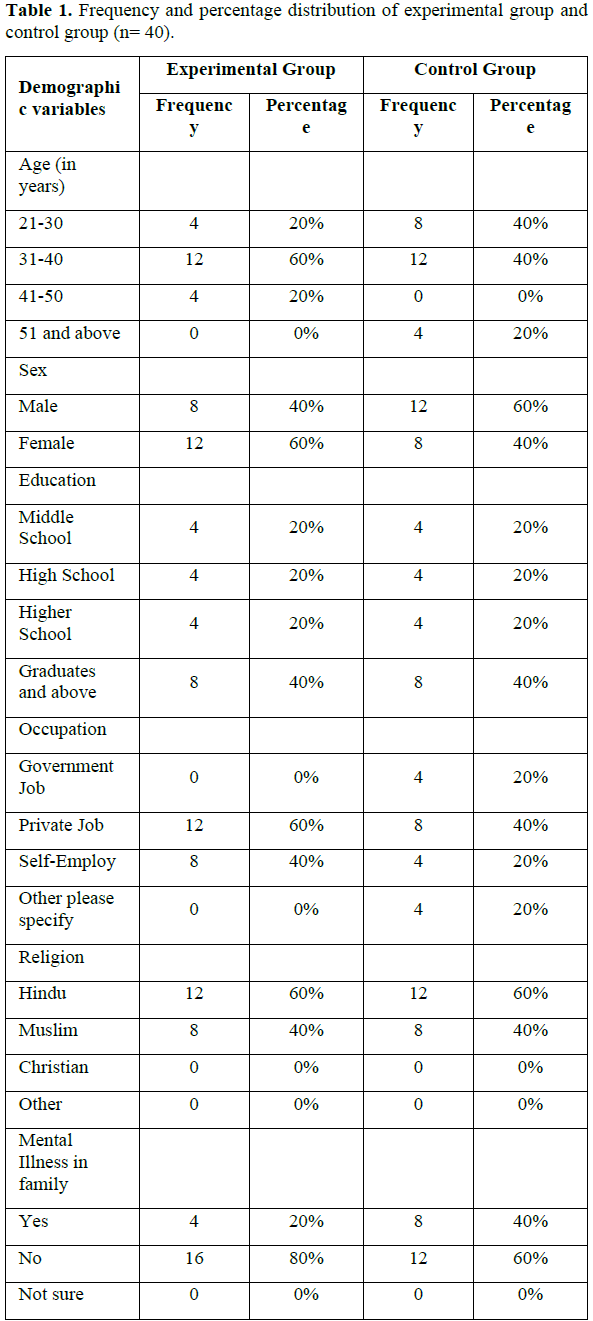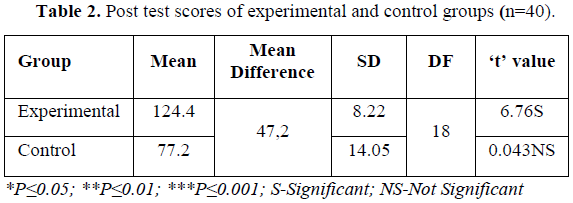-
Publish Your Research/Review Articles in our High Quality Journal for just USD $99*+Taxes( *T&C Apply)
Offer Ends On
Pallavi B*
Corresponding Author: Pallavi B, Associate Professor, College of Nursing, Padhar, Madhya Pradesh, India.
Received: March 31, 2022 ; Revised: April 3, 2022 ; Accepted: April 6, 2022 ; Available Online: April 30, 2022
Citation: Pallavi B. (2022) Assess the Attitude of Adults Toward Mental Illness: A Pilot Study. J Nurs Midwifery Res, 1(1): 1-4.
Copyrights: ©2022 Pallavi B. This is an open-access article distributed under the terms of the Creative Commons Attribution License, which permits unrestricted use, distribution, and reproduction in any medium, provided the original author and source are credited.
Views & Citations
Likes & Shares
Abstract
Background: Awareness for mental illness is a key concept for good mental health in India. A good mental health completes the circle of health which not only includes physical but also includes mental health.
Material & Methods: A nonequivalent control group quasi experimental design was used. There were 40 adults of selected community were selected using purposive sampling technique. In this study 2 groups (20experimental and 20control group) were selected. During data collection information booklet were given to experimental group only. Reliability was calculated. Reliability of tool was established by Split Half method and Spearmen Brown prophecy formula and it was 0.83. The obtained data was analyzed and interpreted in terms of objectives and research hypothesis. Analysis was done by using descriptive and inferential statics.
Result: Score of attitudes assessed by structured attitude scale the mean score of structured attitude scale among experimental group was 124.4 with SD of +/- 8.22, among control group was 77.2 with SD of +/- 14.05 and the computed ‘t’ value was 6.4 This indicates that there was significant difference in the post interventional score of attitudes among experimental group and control group at the level of P< 0.05.
Keywords: Attitude, Information Booklet, Adult, Mental illness
INTRODUCTION
Mental illness is a neglected area which is found in all society in the world. People’s belief that mental illness is incurable also misleading for referred for appropriate mental health care [1]. This implies that the stigma of mental illness frequently reported in the general public can be reduced by education and examination of attitude towards mental illness. People who are suffering from mental disorders also face stigmatizing and experience discriminating attitude from society. It is a great need to understand people’s attitude towards mentally ill people in order to develop positive and effective change for such attitudes [2]. According to WHO report 2020 depression is one of the leading causes of disability worldwide whereas suicide is second leading cause among 15-29 of age group [3]. The new COVID 19 pandemics is greatly affected mental health worldwide. A survey conducted by WHO among 130 countries showing devastating impact of COVID 19 on mental health service.4 WHO also estimated that about 7.5% people are suffering from some mental disorder, approximately 56 million are suffering from depression and about 38 million suffering from anxiety disorders. It is estimated that by end of 2021 about 20% India will suffer from mental illnesses [5]. Mental health could be a major concern worldwide and India isn't way behind in sharing this. If we have a tendency to value developments within the field of mental state, the pace seems to be slow. Dr. Brock Chisholm, the first Director-General of the World Health Organization (WHO), in 1954, had cannily
declared that “without mental state there is no true physical health.” [6]. Awareness and health literacy are two sides of the same coin. Stigma and discrimination are negative consequences of ignorance and misinformation. There are a few studies which have measured mental health literacy in the Indian context. One study found mental health literacy among adolescents to be very low. These findings reinforce the need to increase awareness of mental health. Mental health literacy is a related concept which is increasingly seen as an important measure of the awareness and knowledge of mental health disorders. The pilot study is a small preliminary investigation of the same general character as the major study. The main aim to assess the feasibility, practicability and assessment of measurement [7].
OBJECTIVES
RESEARCH HYPOTHESES
METHODOLOGY
Research Approach: An Evaluating research approach was adopted for assessing the attitude of adults residing in selected community towards mental illness.
Research Design: In this present study nonequivalent control group quasi experimental design was used to assess the effectiveness of Information Booklet on attitude towards mental illness among adult of community. In this study 2 groups (experimental and control group) were selected. Experimental group was intervened with Information Booklet.
E O1 → X → O2
C O1 → → O2
O OBSERVATION
E EXPERIMENTAL GROUP
C CONTROL GROUP
X INTERVENTION (ADMINISTERED INFORMATION BOOKLET)
O1 pre intervention score - attitude score before administration of information booklet
O2 post interventional score - attitude score after administration of information booklet.
Independent Variable: Information Booklet on mental illness was the independent variables in the study.
Dependent Variables: Attitude of community towards mental illness was the dependent variable in the study.
SETTING OF THE STUDY
The pilot study was conducted in Godharmahu, Bhopal community. Data from the pilot study were collected from 40 respondents who fulfil the inclusive criteria. An informed consent was obtained from respondent prior to the study. The purpose of the study was explained to the subjects and confidentiality was assured to all the subjects.
Population
In the present study target population was all adult between the age group of 21 and above residing in Godharmahu community, Bhopal city.
Target Population: The target population of the research study was adults who residing in Godharmahu community of Bhopal city.
Accessible Population: In this study accessible population was the adults residing in Godharmahu community who fulfil the inclusive criteria has been included in the study.
Sample: In the study the sample comprised of 40 adults residing in Godharmahu Bhopal fulfilling the inclusive criteria.
Experimental group: 20
Control group: 20
Sampling Technique: Purposive sampling technique was used to select the sample.
DEVELOPMENT AND DESCRIPTION OF THE TOOL
Section A: Socio Demographic Variables (6 items)
Section A consist of socio demographic variables of adults residing in selected community such as age, sex, education, occupation, religion, family member with mental illness.
Section B: Structured Attitude Scale
Section B It consists of 30 items on attitude towards mental illness. Structured attitude scale.
Section C: Information Booklet
Information booklet was developed on the review of the literature and the objectives state for attitude, the title of the booklet was “mental health and mental illness”. The investigator prepares information booklet on mental health, mental illness, common mental illness, cause of mental illness, myths related to mental illness, rights of mentally ill.
RESULTS
Section I: Socio Demographic Data (Table 1).

Section II: Assessment of Attitude Towards Mental Illness Measured by Structured Attitude Scale.
Attitude among experimental group
Cylindrical diagram shows the attitude among experimental group measured by structured attitude scale. It depicts the majority 12(60%) of participants had unfavorable attitude, and less than half 8(40%) of them had partially favorable attitude towards mental illness. After giving self-instructional module there was change in attitude as most of 16(80%) were develop favorable attitude, and only 4(20%) were develop partially favorable attitude towards mental illness (Figure 1).

Cylindrical diagram showing distribution of attitude level among control group
It depicts the majority 12(60%) of participants had unfavorable attitude, and less than half 8(40%) of them had partially favorable attitude towards mental illness. In posttest there were no change found in attitude majority 11(65%) of participants had unfavorable attitude, and less than half 9(35%) of them had partially favorable attitude towards mental illness (Figure 2).

Section III: Effect of Information Booklet (Structured Attitude Scale)
Data in Table 2 depicts mean score of attitudes assessed by structured attitude scale the mean score of structured attitude scale among experimental group was 124.4 with SD of +/- 8.22, the computed’ value was 6.76 at degree of freedom 18. This indicates that there were significant differences in the post interventional score of attitudes among experimental group at the level of P< 0.01, 0.05.

CONCLUSION
Majority 12(60%) of participants had unfavorable attitude among experimental group & majority 12(60%) of participants had unfavorable attitude among control group, prior to the administration of Information Booklet. Most of 16(80%) were develop favorable attitude among experimental group & majority 4(20%) of participants had unfavorable attitude among control group, after the administration of Information Booklet.
SUMMARY
The present study was undertaken by the investigator to evaluate the effect of information booklet on attitude towards mental illness, among adults of selected community. Mentally ill are seen by most as incurable, because of repetitive nature of the episode of illness. The current trend is complete integration of the mentally ill patient into the normal pattern of medical care with continuity of care from his family doctors, society.
REFERENCES
No Files Found
Share Your Publication :